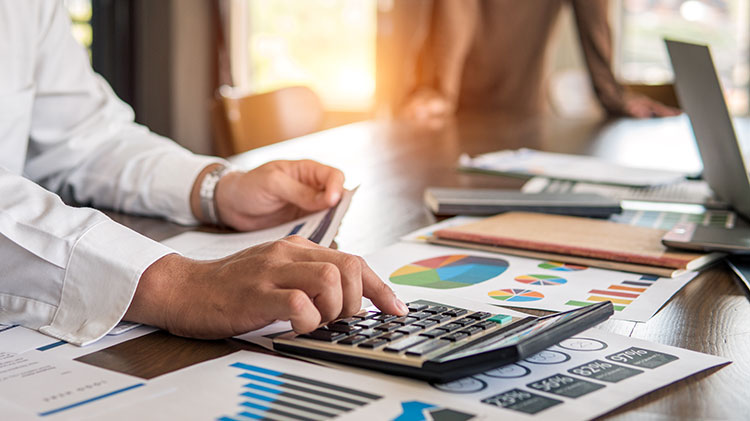Basics of investing
Investing can be a great way to grow your money over time and help you prepare for retirement. Here are some investing basics to help you get started.
Are you new to investing and wondering where to start? You’re not alone. The world of investing can be an intimidating place. However, learning the basic terms and concepts can be a good place to start.
What is investing
The term investing generally refers to the idea of setting money aside now with the expectation that it will earn you a profit in the future.
Are you ready to start investing?
Since the money you’ll be setting aside to invest won’t be readily accessible, first see that you’re prepared in case a financial emergency pops up.
Do you have an emergency fund? It’s helpful to have money set aside in an emergency fund to help cover unexpected costs associated with things like medical expenses, car or home repairs, emergency pet care or loss of income.
How much debt do you owe? Try to get a handle on any debt you may owe on things like credit cards, student or private loans.
What are your goals?
Consider having a set of financial goals identified before immediately jumping into investing. Once you’ve established a few goals, you can start identifying which investment options are aligned with your goals.
Why start investing now
The sooner you start, the longer your money will have the chance to grow with the help of compound interest.
- Compound interest – Earning interest on interest. With compound interest, your money earns more over time than it does with simple interest like in a savings account.
What’s your risk tolerance?
Your risk tolerance is based on how much uncertainty you’re willing to accept from an investment. In other words, how much risk are you willing to take?
- Conservative – Not losing money on an investment is more important to you than making money.
- Moderate – You’ll take on a little risk to make more money, but if things start to go badly, you may adjust your investments to less risky positions.
- Aggressive – You understand that to make the most on your investments, you must take the most risk with your money.
What is a time horizon?
A time horizon is the amount of time you plan to wait before accessing the money you’ve invested. Will you need your money in 5, 10 or 25 years? Your answer will likely influence whether you want to be conservative, moderate or aggressive with your investments.
- Shorter – Generally, if you need access to your invested money in the short term, you might consider a conservative approach.
- Longer – If you can let your invested money work for you longer term, a moderate or aggressive approach may make more sense.
What are some common types of investments?
Investments are grouped into asset classes, or comparable financial securities. While many types of investments exist, here are the most common asset classes:
Cash equivalents are liquid assets that pay you interest for holding your money in them. Some examples are savings accounts, money markets, and certificates of deposit (CDs). They are a low-risk, low-reward investment.
Bonds are basically loans that you, as an investor, make to entities, such as governments, municipalities and corporations. The bond issuers promise to pay you back the full loan amount plus interest. Investors like bonds because they generally give a fixed interest rate; however, bonds are subject to interest rate risk and may decline in value due to an increase in interest rates. Bonds are a medium-risk, medium-reward investment.
- U.S. Government bonds – Issued by the government to get money for a wide range of governmental activities or to pay off the national debt. Government bonds generally hold a low risk as an investment because the government is less likely to fail.
- Municipal bonds – Issued by towns or cities to pay for public projects, such as schools, or to support operating budgets. A municipal bond has different risk depending on the town or city issuing the bond.
- Corporate bonds – Issued to raise money for a company expansion or takeover, or even changes in management structure. Corporate bonds may hold more risk than other types of bonds, depending on the company.
Stocks are shares of a company. When you purchase a share of a company, you become a shareholder. Shareholders make money when the stock price goes up and lose money when the stock price goes down. The company may also issue dividends, which is the company sharing its profits with shareholders.
Stocks are categorized according to the size of their market capitalization (market cap), which is the total market value of a company’s outstanding shares of stock.
- Large-cap stocks ($10B+ market cap) – Stocks issued by larger, well-established companies, that generally have less risk, but also have less growth potential compared to mid- and small-cap.
- Mid-cap stocks ($2B-$10B market cap) – Stocks issued by companies that are growing, that generally have more risk than large-cap, but also have more growth potential.
- Small-cap stocks (up to $2B market cap) – Stocks issued by smaller, newer companies, that generally have higher risk than large- and mid-cap, but also have higher growth potential.
What is diversification and why is it beneficial?
Diversification is a strategy where you invest in different types of asset classes, such as cash equivalents, stocks and bonds, to help reduce the risk of market volatility. Think of diversification as not putting all your eggs in one basket.
How can you achieve diversification?
If you're looking to balance or mitigate the risk levels in your investments, these two investment options may help you achieve diversification since they already include a variety of stocks, bonds and other securities:
- Mutual Funds – Represent a basket of different investments where you pool your money with other investors so you can achieve a higher level of diversification than you could on your own. A mutual fund’s price is determined after the stock market closes each day.
- Exchange-Traded Funds (ETFs) – Similar to mutual funds, EFTs represent a basket of different investments, but one of the differences is that EFTs are repriced throughout the day.
What is an investment portfolio?
An investment portfolio is a collection of assets. In other words, all of your investments. Your portfolio will likely take time to develop and mature, and patience is key. It’s good to keep a long-term perspective in mind as you continue to monitor your investments and build your portfolio, especially when planning for retirement. You may need to make adjustments over time to ensure they continue to align with your objectives.
What is a prospectus?
A prospectus is basically a packet of information that all companies must make publicly available and file with the Securities and Exchange Commission (SEC) when offering investment opportunities to the public. The purpose of a prospectus is to provide detailed information about a company's investment offerings to help potential investors make informed decisions about their investments.
Ready to get started?
Invest with guidance from a registered agent.




